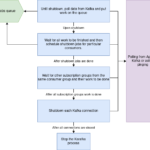AI/ML is reinventing the reality of many industries, including retail. From brick-and-mortar stores to online marketplaces, retail companies are all increasing their investments in artificial intelligence, in order to gain a competitive advantage, better understand their customers and solve some of their long-lasting problems.
Unlike some other spaces, retailers quickly moved towards a data-driven approach, using streams of data for improved speed, efficiency and better business decisions. They collect big volumes of raw data, that come in different formats, and quickly extract, load and transform it, in order to turn it into actionable insights. What are the benefits driving adoption? Let’s look at some key shifts in the industry and how AI/ML can help.
Benefits
of AI/ML in retail
AI/ML has enough power to change the landscape of the retail industry. Amongst the main benefits, there are:
- A shift towards experiences: whereas in the past retailers were focused on simply selling, nowadays they look for creating a competitive advantage by offering enjoyable, personalised experiences.
- The need for improved forecasting: once the retailers get a better grasp on the behaviour and trends of their customers, they can work on better meeting their needs, more attractive pricing offerings and optimised product placement.
- Automated inventory management: even if it does not have a visible impact on the customer side, AI/ML is solving one of the major challenges that retailers face, allowing them to quickly have visibility on their inventory.
Stephen Barnes, Retail Business Consultant , and Andreea Munteanu, Product Manager will host a webinar on AI/ML in retail.
What technologies are used for AI in retail?
Retailers were early adopters of business intelligence solutions such as Qlik or Tableau. They needed to perform ETL processes long before other industries were even considering it and they enabled various teams to have data visualisation capabilities within their companies. However, once the data sources became more diverse and they started including images, video or text, BI started being challenged because of the need to work with multiple data types and much bigger volumes of data.
AI/ML comes in handy as a solution for modelling using diverse types of data, but the chosen technology still depends on each company’s choice. Open-source MLOps solutions, such as Charmed Kubeflow allow retailers to benefit from having end-to-end model lifecycles within one tool.
A sample use case: market basket analysis
Market basket analysis is a technique used by big retailers to discover associations between items that occur frequently in transactions. In fact, it allows retailers to identify what people buy, by using association rules that highlight their habits. Retailers benefit from initiatives like this because of the market strategies they can develop, as well as a better understanding of what is actually exciting for their customers.
Learn more about Charmed Kubeflow
Discover more from Ubuntu-Server.com
Subscribe to get the latest posts sent to your email.



